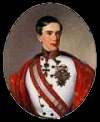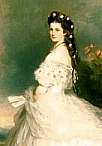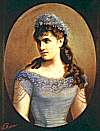
 Franz Josef was crowned Emperor of Austria in 1848 at the age of 18 after the Hungarian revolution, as his predecessor was simply deposed. He was also crowned King of Hungary in 1867 in an attempt to calm the situation with the problematic Magyars (Hungarians). This only worked due to the personality of his very popular wife Elisabeth (Sisi), who was accepted by the Hungarians as their "real" sovereign.
Although Sisi usually stayed out of politics, she made a great exception as far as Hungary was concerned. Elisabeth's interest in politics developed as she grew matured. She was liberal and forward-minded. The empress placed herself decisively on the Hungarian side in the nationality conflict thereby making an important contribution to the historic compromise of 1867. Hungary's gaining an equal footing with Austria also strengthened the liberal element in the monarchy as a whole. Elisabeth attained an unparalleled position of respect and affection in Hungary, one which has lasted until the present day. Emperor and King, still Francis Joseph`s life was not without its trials and sorrows. Early on as Emperor he lost major wars to France (1848) and Prussia (1866). His brother, Maximilian, was executed in Mexico. His son, Crown Prince Rudolph, committed suicide in 1889 followed by his wife's assassination by an anarchist in Geneva (1897). He had numerous difficulties with his nephew and heir, Archduke Franz Ferdinand, who was assassinated by Serbian nationalists on 28-Jun-1914 in Sarajevo (Bosnia-Herzegowina), which resulted in world war I. The aging monarch had seen The Holy Roman Empire lose its holdings in both Italy and Germany until it had become mainly an eastern European power. Franz Josef was sensitive to these losses and was determined not to allow further decay of the empire by losing Austro-Hungarian holdings in the Balkans to Serbia. It has been said that he was "the last monarch of the old school". The Dual Monarchy lasted until his death in 1916.
|

 |
 |
Created 1994 by © LabelArt WebDesign - Austria |

 In the summer of 1853 at the scenic Salzkammergut town
In the summer of 1853 at the scenic Salzkammergut town
